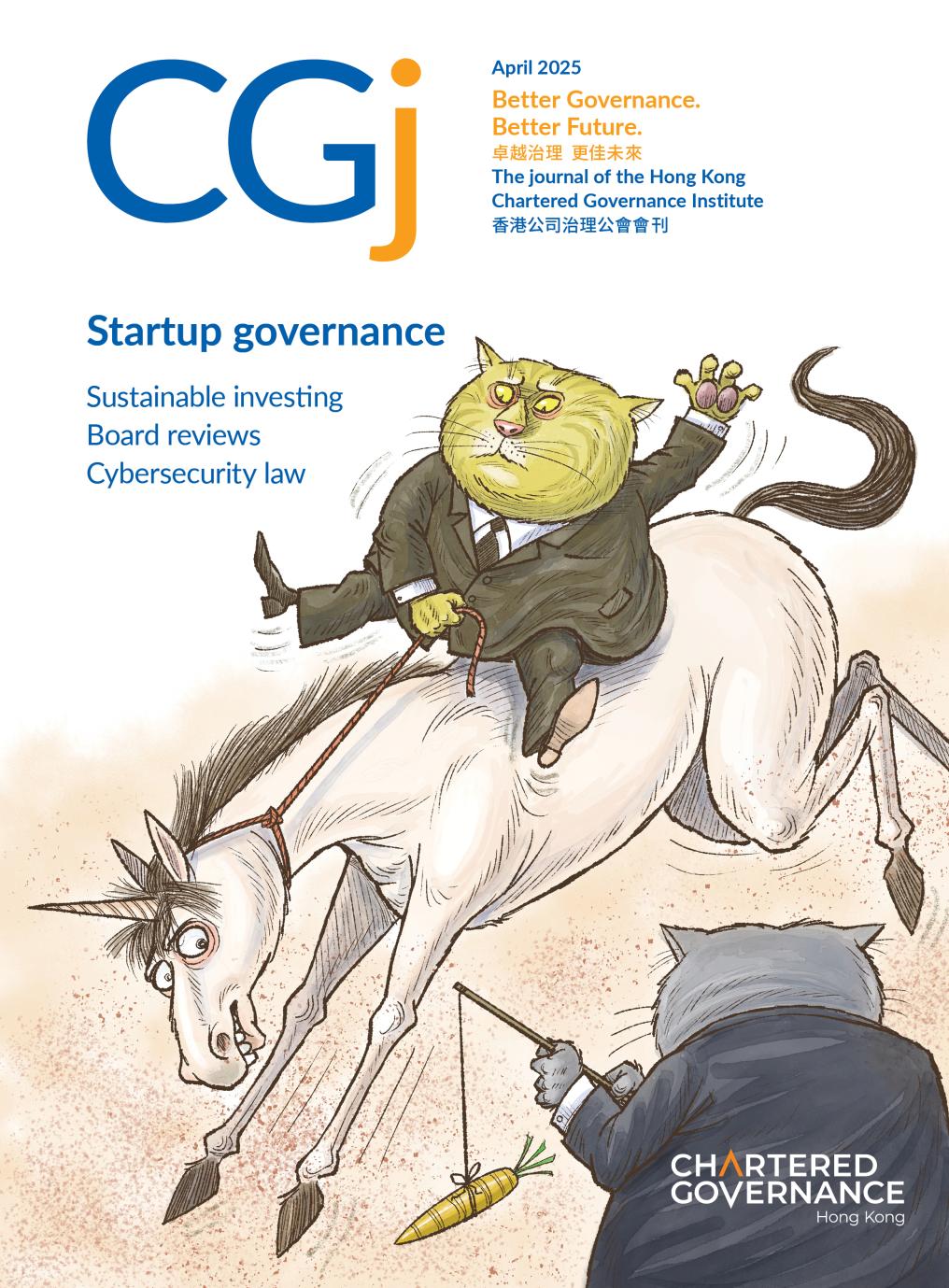In this month’s GoldenGen Reflections series, CGj talks with CK Low FCG HKFCG, former Council member and former Chairman of the Qualifications Committee.
When did you first join the Institute and what was your professional role at that time?
‘I first became involved with the Institute around 2002 on an informal basis. Because I had been an academic since 1992, through friends and colleagues I was invited to join groups like the Technical Consultation Panel and the Academic Advisory Panel as a member. I was admitted to the Institute as a Fellow in August 2013. In January 2019, I was elected to Council and served a six-year term, which concluded in December 2024. I retired from the Chinese University of Hong Kong (CUHK) Business School at the end of July 2022, nearly three years ago now.’
Did membership of the Institute support your career development and, if so, in what ways?
‘Yes and I believe it’s a circular relationship. I’ve always felt that academics shouldn’t live in an ivory tower, but should actively engage with the profession, while the professional world would also benefit from academic research. I’ve been fortunate enough to learn from and contribute to committees such as the Listing Committee of The Stock Exchange of Hong Kong Limited, the Advisory Committee of the Accounting and Financial Reporting Council and the Standing Committee on Company Law Reform, among others. These roles aligned with my research and publications, even though not everyone agreed with my perspectives. But what I think happens is, if you make a public stand about an issue, even if you are in the minority, people will take notice.’
Can you share some of your own golden reflections of your years with the Institute?
‘One of my best memories was being part of the Technical Consultation Panel. I learned a lot from senior practitioners about the real challenges of implementing regulations. As an academic, I might have thought things were quite simple, but then you go around the table and realise that this is actually very difficult to implement. That opened my eyes quite a bit and it’s the reason why I think it is particularly important to bridge the practitioner and academic divide.
I especially valued my role as Chairman of the Qualifications Committee over the past two years, in which – amongst other topics – I advocated for a more holistic approach to assessments. Members were receptive to the concept of CGQP 2.0, aiming to reduce reliance on exams for admissions. The idea was to complete 50% of your assessment through practical work before sitting for the exams.’
How has corporate governance education evolved over the years?
‘Corporate governance education has definitely evolved, but progress has often been slow. I had suggested that my department at the CUHK Business School explore areas like ESG or compliance over a decade ago, but this failed to gain traction. It is only recently that the department has started to integrate ESG reporting into the curriculum. Students’ interest in corporate governance is growing, but the exposure remains theoretical, often relying on academic research. Wherever possible, I encouraged the infusion of practical perspectives by inviting senior governance professionals and regulators to my courses as guest lecturers, allowing students to interact with experts.’
Despite having retired, do you still play a role in governance? If so, what areas interest you the most?
‘I maintain my involvement with the Institute. I am still a member of the Qualifications Committee and I currently chair the Investigation Group, which reviews whether members should be referred to the Disciplinary Tribunal. As regards the latter, my main goal has always been to ensure that meetings are unnecessary – in other words, that there are no breaches of the rules by our members.
Outside the Institute, I have retired from all my government roles. I made a conscious decision to step back as I feel it’s time for younger individuals to step forward with their energy and ideas. That said, I am still interested in governance topics such as directors’ duties and shareholder rights, and I am involved in informal consultations and seminars. For example, I’ve written a chapter on the delisting framework in Hong Kong, which will be published later this year.’
What advice would you give to the younger generation starting out on their governance careers?
‘The key advice I always gave my students is to do the right thing. Never do something that will see you on the front page of the newspaper for the wrong reasons. In a materialistic society, there’s always pressure to get ahead, but it’s important to do so ethically. Secondly, I would emphasise humility. If you’re good at what you do, it’s not up to you to shout about it to the world. Let others recognise you. Communication is also vital, especially in the era of social media. However, I always reminded my students that communication via electronic means is not full communication. It is an important part, certainly, but it’s not everything. Face-to-face communication is equally, if not more, important. Lastly, I would say that career success isn’t about accumulating material wealth or status symbols, instead it’s more about building a reputation and earning respect. Your reputation takes years to build, but can take only one mistake to destroy. The pie is always growing – one’s success does not mean that someone else has to fail, as we can progress together.’
career success isn’t about accumulating material wealth or status symbols, instead it’s more about building a reputation and earning respect
CK Low FCG HKFCG
former Council member and former Chairman of the Qualifications Committee
本期的睿思智享系列中,CGj与前理事会成员兼前专业资格委员会主席刘志强先生 FCG HKFCG 进行了访谈。
您是什么时候加入公会的?当时您的专业身份是什么?
‘我最初是在2002年以非正式的方式参与公会事务。我从1992年开始从事学术工作,通过朋友和同事的推荐,被邀请加入了专业知识咨询小组和学术咨询小组担任成员。 2013年8月,我成为公会资深会士。2019年1月当选理事会成员,开始了为期六年的任期,该任期于2024年12月结束。2022年7月底从香港中文大学商学院退休,至今已经快三年了。’
公会的会员资格是否有助于您的职业发展?如果有,在哪些方面?
‘是的,我相信这是一个相辅相成的关系。我始终认为, 学者不应该生活在象牙塔里,而应该积极与专业界互动, 同时专业界也可以从学术研究中受益。我很幸运能够参与到一些委员会中,向他们学习,同时贡献所长,比如香港联交所上市委员会、会计及财务汇报局咨询委员会,以及公司法改革常务委员会等。这些角色与我的研究和出版物相契合,尽管并不是所有人都同意我的观点。但我认为, 如果你对一个问题公开发表立场,即使你是少数意见,人们也会注意到你。’
能否分享一些你在公会多年中的黄金回忆?
‘我最美好的回忆之一是参与专业知识咨询小组。我从资深从业者那里学到了很多关于实施法规的实际挑战。作为学者,我可能会觉得事情很简单,但当你与大家讨论时,你会发现实际操作起来非常困难。这让我大开眼界,也正因为如此,我认为弥合从业者与学术界之间的差距非常重要。 我特别珍惜过去两年担任专业资格委员会主席的角色,其间我提出多个主张,包括采用更全面的评估方法。成员们接受了CGQP 2.0的概念,旨在减少对考试的依赖,通过实践工作的方式完成50%的评估,然后再参加考试。’
公司治理教育多年来是如何演变的?
‘公司治理教育确实有所发展,但进展往往较慢。我在10多年前就建议中大商学院的部门探索ESG或合规领域,但并没有得到支持。直到最近,该部门才开始将ESG报告融入课程之中。学生对公司治理的兴趣正在增加,但接触依然局限于理论层面,通常依赖学术研究。只要有可能,我就会邀请资深治理专业人士和监管者来参加我的课程並作为客座讲师, 让学生与专家互动,以鼓励学生融入实用的观点。’
尽管已退休,你仍然参与在公司治理的领域吗?如果是,你对哪些领域特别感兴趣?
‘我仍然参与公会的工作。我仍然是专业资格委员会的成员,亦担任调查小组的主席,该小组审查是否将会员提交纪律审裁处。我的主要目标是希望不必召开纪律审裁处会议,换句话说,会员没有违反我们的规则。
在公会以外,我已经退出了所有政府角色。我有意识地决定退下来,因为我觉得现在是时候让精力充沛和有想法的年轻人发挥所长了。不过,我仍然对一些治理主题感兴趣,比如董事职责和股东权利,我也参与一些非正式的咨询和研讨会。例如,我撰写了一个关于香港退市框架的章节,将在今年晚些时候出版。’
您对刚刚开始治理生涯的年轻一代有什么建议?
‘我一直给学生的最主要建议是做正确的事情。永远不要做那些会让你因为错误的原因登上报纸头条的事情。在物质化的社会中,总是会有向上爬的压力,但重要的是以合乎道德的方式行事。其次,我强调谦逊。如果你表现出色,不需要自己向全世界宣扬,而应该让别人来认可你。 沟通也至关重要,尤其是在社交媒体时代。然而,我总是提醒我的学生,通过电子方式进行沟通,并不是全面的沟通。电子沟通方式确实是重要的一部分,但不是全部;面对面的交流同样重要,甚至更加重要。最后,我想说,职业成功并不在于积累物质财富或地位象征,而是建立声誉并赢得尊重。声誉需要多年才能建立,但郤可以因为一个错误而毁于一旦。一个人的成功并不意味着别人必须失败,我们可以共同进步。
职业成功并不在于积累物质财富或地位象征,而是建立声誉并赢得尊重。
刘志强先生 FCG HKFCG
前理事会成员兼专业资格委员会主席



